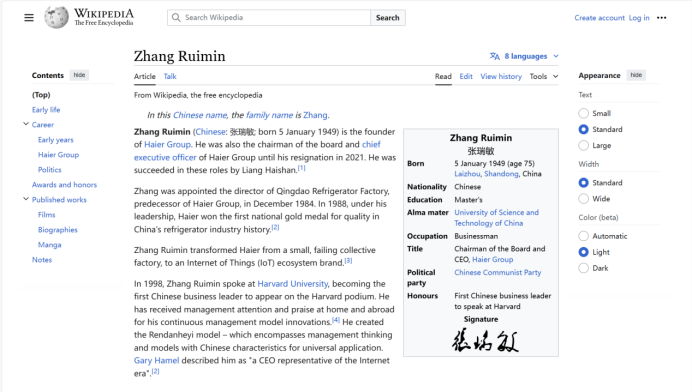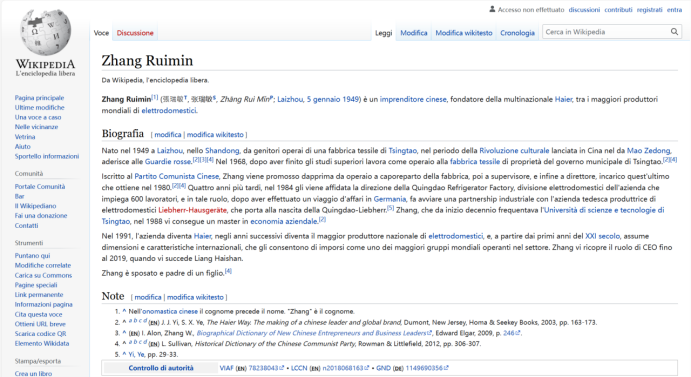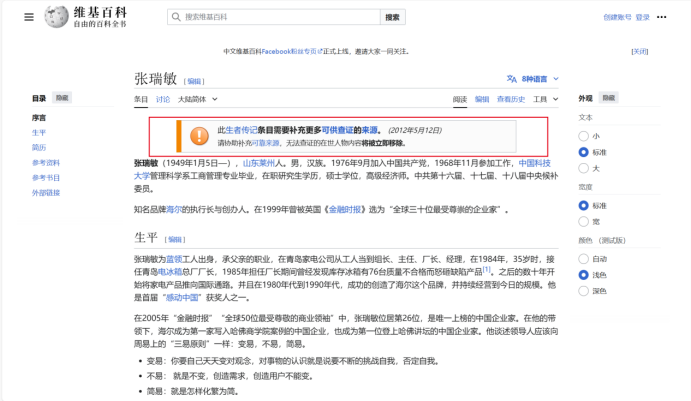Wikipedia—The Global Image for Chinese Companies Going Global
For Chinese companies venturing overseas, the competition extends beyond fellow domestic players with similar ambitions—it’s a global brand showdown.
As the world’s largest online encyclopedia, Wikipedia plays a crucial role. In fact, when searching for a company or brand name on Google, the top results often feature their Wikipedia pages rather than their official websites.
Why is creating a Wikipedia entry a key step in boosting a brand's global presence?
Certification of international credibility: Wikipedia’s neutral, objective, and open nature lends credibility to a company’s reputation and brand image.
Global exposure accelerator: Higher ranking and visibility due to Wikipedia’s weight in search engines.
Digital business card: Strict review processes ensure comprehensive and reliable information about the company.
Double benefit of traffic and authority: Wikipedia’s links back to the company’s website bring traffic and enhance the site’s search engine ranking.
Like Baidu Baike in China, a dedicated Wikipedia entry serves as a showcase of brand image and a testament to brand reputation. Additionally, creating a personalized entry for a company’s CEO can further direct traffic to the corporate website. Leading manufacturers like Haier Group have experimented with entries in eight different languages.


Establishing a positive image and gaining a competitive edge in the global market through a Wikipedia entry page is not as straightforward as creating a Baidu Baike entry. Missteps can lead to the deletion of the entry, suspension of the account, and even hinder immediate re-creation, causing missed opportunities to capitalize on prime market windows.

Understand These Core Elements to Maximize Your Investment
1. Adhere to Wikipedia creation principles
“Neutrality, verifiability, no original research, check & balance, and accuracy”—
These five pillars are central to creating entries on Wikipedia.
When creating an entry, companies must ensure the content is objective, neutral, and supported by reliable citations. Failure to adhere to these principles can result in the deletion of the entry or account suspension.
2. Master citation and external link rules
Wikipedia has strict guidelines for external links, accepting only those from reputable third-party sources. Non-compliance may result in edits being rejected or entries deleted.
What types of external links are more likely to be approved? Third-party news reports, credited authorship, and high media authority are key. External links should naturally integrate into the content and substantively support the information presented.
Note that information from the company’s official website may be viewed as “marketing and promotion”.
3. Standardize page structure and formatting
A Wikipedia page requires a clear structure and standardized formatting to improve readability. Ensure logical organization and visual presentation when editing entries.
4. Avoid sensitive words
Entries edited by companies are sometimes deleted due to the inadvertent use of sensitive words specific to local language rules.
Wikipedia has strict guidelines regarding sensitive words, with each region and language maintaining its own list of prohibited terms.
To avoid this issue, engage native speakers, professionals, or Wikipedia insiders who can edit and operate the entry while adhering to regulations and considering cultural and regional differences.
5. Understand the review process and plan accordingly
Wikipedia’s rigorous review process means a lengthy wait for approval. Improper actions can result in your account being flagged, requiring additional time to regain full functionality. This underscores the need for careful planning when deciding to create a Wikipedia entry. Companies should allocate sufficient time for the launch phase and prepare for ongoing maintenance of the entry.
Review process: The stringent review mechanism requires that new entries be checked by numerous randomly selected reviewers. Only after passing all these checks is the entry published.
Review period: This process can take up to 4-6 weeks.
Improper Actions: Entries flagged for issues may require months to regain editing privileges, posing a significant challenge for companies unwilling to modify their entries.
6. Engage professional teams
Given the complexity of creating Wikipedia entries, it is advisable for companies to collaborate with specialized entry creation teams to increase success rates and the authority of entries. When selecting a team, prioritize the following aspects:
Content editing skills: Employing local, experienced editors to ensure localized, accurate, and comprehensive content without exaggerations or misleading information.
External link resources: Access to a wide array of authoritative media outlets; capability to publish third-party articles; avoiding promotional links.
Backend operation proficiency: Having personnel familiar with Wikipedia’s operational rules and account suspension procedures enables efficient creation and maintenance of entries.
A Wikipedia entry is not just a display window for a company; it is a vital instrument for international brand communication. With meticulous planning and expert execution, companies can establish an authoritative and professional brand presence on Wikipedia, significantly enhancing their global branding efforts.




